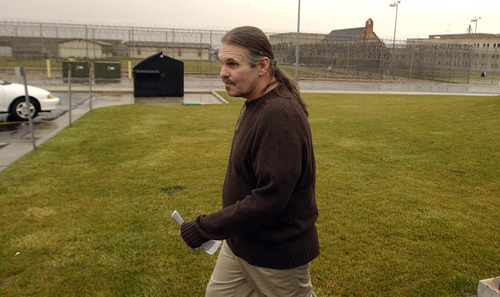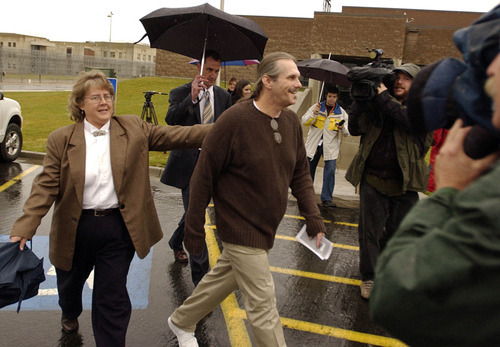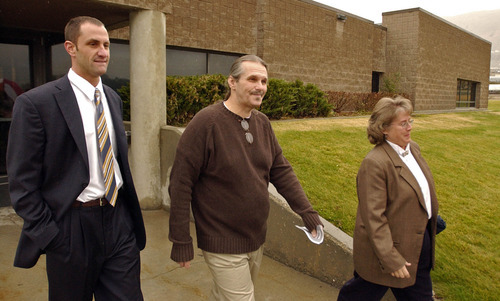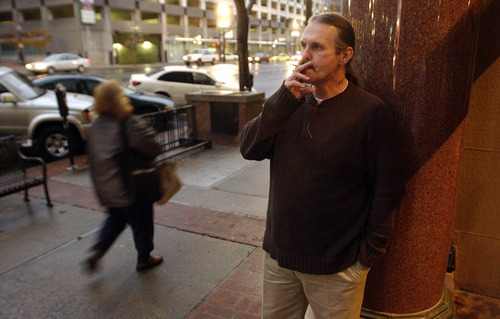This is an archived article that was published on sltrib.com in 2012, and information in the article may be outdated. It is provided only for personal research purposes and may not be reprinted.
He calls himself Smokey, an original gangster who for a time moved "85 pounds of commercial Colombian" a week; who slept with as many women as he wanted but always went home to "take a shower and take care of my old lady"; who drank hard and used every drug you can name; who would have taken a knife, as he has to other men, to those skinhead punks who beat him up last fall and stole his clothes and cell phone.
That was then. Now, there are mornings he can hardly lift a coffee cup.
He talks fast, but his body is slowing down. He turns 62 in a couple of weeks. He's in the early stages of Parkinson's disease and has 21/100 vision in his right eye.
He wants that cell phone back so he can call his granddaughter.
He admits he's done terrible things, but not the thing that kept him in prison for nearly a third of his life, before being allowed to leave a free man.
"I did not kill Sherry," he says now, as he's insisted from the beginning.
He is talking fast when the recorded voice cuts in, reminding him as it does all the inmates at the Riverside County jail, that someone could be listening in or recording.
For Bruce Dallas Goodman, this is freedom now.
—
'Glad it's over' • Goodman walked out of the Utah State Prison in November 2004, under gray skies and cold rain. He was 54, and a free man, his conviction for raping and murdering his girlfriend 19 years earlier overturned because of new DNA testing.
His hopes were simple. He told reporters he wanted to get some Mexican food that night with a woman he'd swapped letters with while in prison. He wanted a cigarette and some Jack Daniel's.
"I'm just glad it's over," he said.
He could not have known then that his struggles were anything but over. Eight years later, Goodman, who never received recompense for his imprisonment, is homeless, living in Southern California. For him, the freedom has been strife: an alienated family, cold nights spent sleeping in the desert dirt, assaults and thefts, a return to drug use, jail and prison.
"Ain't a damn thing comes easy," Goodman says in one of several recent phone interviews with The Salt Lake Tribune.
—
Blood in the snow •Goodman met Sherry Ann Fales Williams at the Arizona State Fair in October 1984. The 21-year-old Williams had left her truck-driver husband in Salt Lake City, and Goodman says he was "looking for a girl who ran off with my dope in Palm Springs."
"I met Sherry," he says. "She hit on me. We hooked up immediately."
The couple left Phoenix for Las Vegas, where they lived for about a month. Fighting plagued their new romance.
In late November, Goodman said, Williams left to hitchhike back to her husband in Utah. Goodman later testified at trial that he followed her in his truck to a freeway on-ramp, but eventually let her go.
Her body was found off Interstate 15, near the Manderfield exit in Beaver County. She had been bound at the knees and wrists, and she was partly nude. She had been raped and object sodomized. She died from eight or more blows to the head. She was found in the bloody snow, with defensive wounds on her hands and strands of brown hair in her fingers.
An employee at the Peppermill Casino in Mesquite, Nev., told police she had seen Williams and Goodman, who was said to be wearing a distinctive denim vest and had multiple tattoos, fighting in the casino in the early hours of Nov. 30. He became the suspect.
Tests of the crime scene fluids showed that the perpetrator had type A blood, the same as Goodman's. He was convicted of murder in a 1985 bench trial and sentenced to up to life in prison.
On appeal in 1988, the Utah Supreme Court called Goodman's a "close case," but upheld the conviction by a 3-2 vote.
In dissenting, Justice I. Daniel Stewart wrote: "Clearly, the state should have to prove more than the fact that the defendant could have committed the crime because he was with the victim six hours before her death and had argued with her."
—
A conviction vacated • Scientific improvements paved the way for a wave of DNA exonerations, beginning in 1989. Late last month, a Louisiana man was released after 15 years on death row, becoming the 300th prisoner freed because of new DNA testing, according to the Innocence Project in New York City.
Goodman is included among those 300.
The DNA in Goodman's case came from Williams' body and a cigarette butt found at the crime scene. In late 2004, Goodman's attorney, Josh Bowland, told him the samples did not match his DNA. He was not surprised.
"The one unique thing about innocence is that it don't change from day to day today like the Mormon doctrine," Goodman says. "I'll be that way for 100 years."
The Rocky Mountain Innocence Center filed a post-conviction claim and the state agreed to vacate the conviction. Prosecutors in Beaver County ultimately decided the new evidence would cast reasonable doubt on the case and elected not to refile charges.
Eighteen years, nine months and five days after his conviction, Goodman walked free.
His attorneys brought him a shirt, sweater, socks, jeans and shoes the day he was released. They fought with prison officials to let Goodman keep his state-issued underwear.
Unlike prisoners who are paroled, Goodman was not entitled to benefits. He left with a $120 check, money he'd saved during his time, and had to find a bank that would cash it without ID. His had been lost.
"It just makes me angry," Goodman says now. "I lost my whole f——— life to Utah. I'm mad as hell."
—
'I'm so dysfunctional' • Goodman had no ties to Utah before he was convicted here, so he left within a few days of his release, headed east with his pen-pal fiancée to Michigan City, Ind. He worked for a time at a restaurant, making hot dogs and burgers and a medium-rare prime rib sandwich he swears businessmen from Chicago made the trip to try. He washed bottles, worked long hours and felt bogged down by his new life.
"Spending that much time in prison as an innocent person is really, really damaging," says Jensie Anderson, president of the RMIC. "Both physically and mentally, he was damaged."
He bounced around the states and ended up in California.
"Once I came back down to California, I couldn't find any work, so I started slinging drugs," Goodman says. He sells speed when he's on the street. "But I don't sell drugs to kids or pregnant women," he says. He used to make good money dealing, but now he says he feels his age and deals less.
"I'm tired of chasing it, and I'm tired of the thrill anymore," he says. "It's all about the rush and it's all gone. I'm just an old dope fiend who is tired."
He's been in and out of jail in recent years, arrested on parole violations for using, selling, burglarizing, carrying a loaded weapon and panhandling.
"I'm so dysfunctional you don't have a f——— clue," he says. "Twenty years in the Utah State Prison, that's what I know."
—
A 'shining victory'? • The national Innocence Project lists Goodman as an exoneree, and he was the local RMIC's first DNA victory.
But there is a difference between not guilty and innocent.
If a court found him to be "factually innocent" of Williams' murder, he would be entitled to more than $500,000 in what the state calls assistance payments for the wrongly convicted — a benefit established four years after Goodman was freed.
"He's really a forgotten person in the system," Anderson says, but adds the RMIC hopes to fix that one day. "You get them out and you cut them loose. Is that fair? That's always on our minds."
The Innocence Center is investigating Goodman's case further and plans to file an innocence claim at some point in the future.
Assistant Attorney General Erin Riley, who handled the 2004 post-conviction case for the state, says Goodman could be entitled to money, but doubts the DNA evidence alone will suffice.
"Just the fact that the DNA did not match Mr. Goodman," she says, "doesn't mean he was not involved in the murder."
The medical examiner found that Williams had sex 24 to 36 hours before her death. That could mean she cheated on Goodman, angering him and leading to the murder, Riley says. Or the DNA could have been tainted by unsophisticated collection practices.
"That's the problem," she says. "There are so many possibilities."
Anderson and the RMIC want to do more digging to bolster their case before filing an innocence claim. But to do that, they need Goodman to authorize the release of certain documents. It's been a challenge to move the case forward when Goodman cannot afford a notary and lives a transient lifestyle that means he sometimes loses touch for years at time.
"I don't know what anyone thinks they're going to dig up," Goodman says. As far as he's concerned, he's heard stories of compensation for years without seeing cash.
"They got a lot of donations for a shining victory," he says of the RMIC, "and I got a foot in the a—, and that's all I've ever gotten."
"I understand Bruce is frustrated," Anderson says. "But these cases take a lot of time, and it's almost like starting over."
Goodman's hopes for receiving compensation are slim. If he ever does get the money, though, he knows how he'll use it.
"First off, I'd buy myself a two-quarter-ton dually and pay Utah their $1,500 for drunk driving" in North Salt Lake a year after his release, he says. "I'd buy a 32-foot Airstream and an Indian Chief and take my granddaughter across the Great Divide and the Grand Canyon and up the coastal highway."
Maybe he'd show her the place where he sets up his camp.
"The desert is my temple," he says. "All this wide open space out here. The colors. People say, 'It's all brown and sh—.' You are crazy. There are purples and blues and reds. Every hue."
—
Tracking time • Everything changed in those nearly 20 years at the Point of the Mountain — his family, his health, the bus system.
"I don't do time anymore. I don't keep track of it," he says. "I quit doing time a long time ago. I got caught in the vortex. There's no reason to keep track of it. What the hell? It don't mean nothing unless you're keeping track of it for a reason, and, believe me, I can't find any reason to keep track of it. One day is as sorry as the next."
Of course, he has not lost track of all time.
He knows how long he spent in the Utah State Prison.
He knows there are only a few days until he turns 62.
He knows when his granddaughter's birthday is.
The little girl lives in Tucson, Ariz., with a mother who hardly ever talks to her father. And he's felt a bond with the child since he got out of prison.
"The day I got out of the joint, she was a couple years old. I walked in the room and she looked around at her grandma and her momma and her daddy and everybody walking on eggshells around me. She came up to me and said, 'Grandpa.' " They spent time just laying on the couch and watching cartoons.
"She's smart, man," he says. "She knows what time it is."
—
A debt unpaid • Goodman has committed crimes in Arizona, California, Oregon, Ohio, Illinois, Nevada, Kansas, Texas and Utah.
He pulled a knife on a group of men in Phoenix when he was 18. In the Utah State Prison, he stabbed another inmate in the neck with a pair of scissors during a confrontation in his cell.
He's used opiates, methamphetamines, hallucinogens, barbiturates, cocaine and prescription drugs.
"I did not kill Sherry," he says, repeating the words he's stated at trial and during a 1989 parole hearing.
"The facts of the crime suggest that the person who committed this crime, who did these things to this victim, was extremely depraved," former board member Victoria Palacios said at that hearing. "Brutal just doesn't begin to describe what happened. If you did the crime, you certainly are deserving of a five-to-life sentence. If you did not, then obviously even a day in prison is too much."
Save for a 2000 parole hearing, Goodman has always maintained his innocence.
Goodman told a board member he did not remember the crime, but accepted responsibility for committing it. "I tried to give them what they wanted to hear," he says now. "I accepted responsibility because I could have changed the outcome of the situation. … Guilty? I feel guilty as hell. Did I commit the crime? No."
On Tuesday, Goodman appeared in a California courtroom. Faced with probation violations for drug possession and panhandling on a freeway, Goodman admitted guilt for crimes he committed. He was ordered to be released from the jail where he's been since July.
He paid the way he always has, with days and weeks. But he holds little hope he'll be paid for the years he lost in Utah.
"I've never had a problem compensating society for [my] misbehaving," he says. "I'm not an angel, but I'll tell you what, I play by the rules and I always have. I believe in the program. I believe in justice, or I used to."
Twitter: @aaronfalk









